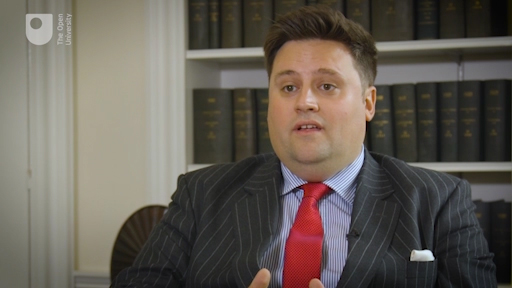4 Judges
A judge is the person who presides over a court. A judge is responsible for ensuring that the court conducts its business properly and makes decisions in the cases brought before the court. In some instances it will be for the judge alone to decide on the outcome of proceedings and the appropriate remedy or sanction, and in others the outcome will be decided by a jury with the appropriate sanction then determined by the judge. Given the fundamental importance of courts, it is vital that particular arrangements are in place to ensure that appropriate individuals are appointed to this important role.
You should now watch this video in which Scott Manson reflects on the role of judges.

Transcript: Overview of the role of the judiciary in law making
Judges operate with the direct authority of the Crown, however, as you have seen in accordance with the concept of separation of powers, it is a fundamental principle of justice that they are independent. This is because judges have the responsibility for ensuring that the law is enforced justly and consistently. The ability to do this impartially would be prejudiced if they were subject to economic or political pressures. In order to ensure this independence is not compromised, judges can only be removed from office in exceptional circumstances.
In Scotland judges (who are salaried and full time) are appointed by the Queen on recommendation of the First Minister. Applications and recommendations are made by the Judicial Appointments Board for Scotland (JABS). The First Minister is required to consult the Lord President on any recommendation for judicial appointment before making their recommendation to the Queen.
Box _unit7.5.1 Box 3 Example of the skills a judge requires judicial qualities
Legal Knowledge Skills and Competence
Knowledge of the Law
- A comprehensive knowledge of the law of evidence
- Thorough knowledge of the procedural law appropriate to the Court of Session
- A high and expert level of knowledge of the substantive law in the main area of the applicant’s practice
- A fully developed understanding of the areas of substantive law most commonly encountered in the Court of Session, along with the motivation and demonstrable desire to master new and unfamiliar areas of the law that emerge during the period of service as a judge.
Skills and Competence in the Interpretation and Application of the Law
- a thorough understanding of the theory and principles on which the law is based and an ability to analyse and explore legal problems creatively and imaginatively
- excellent skills in the interpretation and analysis of case law and statute law
- excellent skills in identifying and distinguishing issues of fact and law
- excellent skills in applying the relevant law to relevant facts
- demonstrable ability to interpret and apply the law in unfamiliar areas; in particular applicants from an exclusively civil practice will require to demonstrate an ability to adapt to operating in the High Court. Experience in both fields would be an advantage.
Judicial and Personal Qualities
Personal characteristics
- integrity
- independence of mind and moral courage
- fairness and impartiality
- common sense
- understanding of people and society
- responsible attitude and sound temperament
- courtesy and consideration
- ability to command respect
- resilience.
Case management skills and efficiency
- ability to manage individual cases efficiently and effectively
- ability to manage caseload efficiently and effectively
- resolution, conscientiousness and diligence.
Communication skills
- ability to communicate clearly with all court users
- ability to reach legally sound judgments and explain the reasoned basis for any decision.
Activity _unit7.5.1 Activity 1 What judges do
Take a few moments to reflect on what you have learnt in this course about the role of judges and the importance of the principle of separation of powers. Make a note of what you think the key points are.
Discussion
There is no right answer to this activity – what you have chosen will depend on your own views. These are the notes that the team made and you may find it helpful to compare your notes with these and identify similarities and differences.
Judges have a number of characteristics and these are reflected in the role they undertake in the justice system.
- They are independent. This means that they should have no interest in the outcome of any case they hear and they should have no connection to anyone in the case.
- They listen to all the parties (whether pursuer, defendant or prosecutor) in a case with equal attention giving impartial decisions based on the law and facts.
- Judges have the responsibility to determine disputes. They must decide the outcome by application of the law to the facts and evidence before them.
- They have the power to impose a wide range of sanctions on those who break the law, from monetary compensation to taking away a person’s liberty by sending them to prison.
